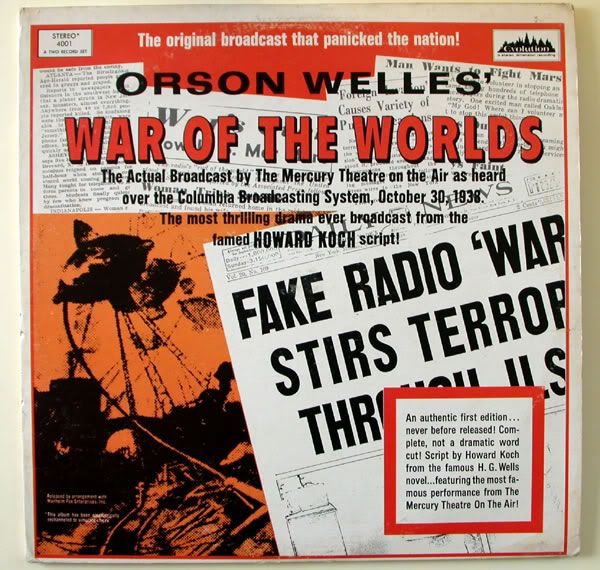
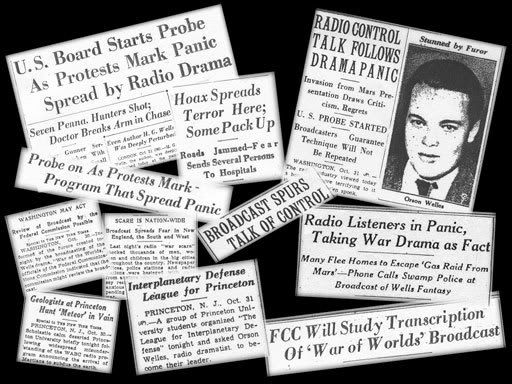
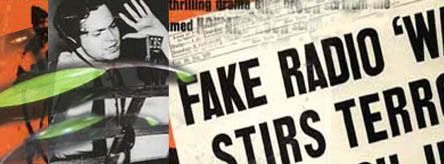
The War of the Worlds was an episode of the American radio drama anthology series Mercury Theatre on the Air.
Directed by Orson Welles, the episode was an adaptation of H. G. Wells' classic novel The War of the Worlds (1898), and was performed as a Halloween special on October 30, 1938.
The first half of the 60 minute broadcast was presented as a series of news bulletins, and suggested to many listeners that an actual Martian invasion was in progress. There was public outcry against the episode, but it launched Welles to great fame. There is controversy about whether people panicked in the streets, and a series of urban legends have grown up around the production which suggest that major disturbances took place.
Welles's adaptation is arguably the most well-known radio dramatic production in history. It was one of the Radio Project's first studies.
http://en.wikipedia.org/wiki/The_War_of_the_Worlds_(radio)
Radio Station "Attack By Mars" Panic 1938/10/31 (1938)
War of the Worlds: The Broadcast
http://www.war-of-the-worlds.org/Radio/
The War of the Worlds (radio)
http://www.answers.com/topic/the-war-of-the-worlds-radio?cat=technology
Oct. 30, 1938: The War of the Worlds Radio Show Is Broadcast
http://entertainment.howstuffworks.com/war-of-the-worlds.htm
The War of the Worlds"
by H. G. Wells
as performed by
Orson Welles & the
Mercury Theatre on the Air
and broadcast on the
Columbia Broadcasting System
on Sunday, October 30, 1938
from 8:00 to 9:00 P. M.
http://members.aol.com/jeff1070/script.html
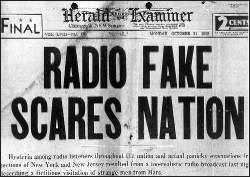
War of the Worlds Radio Broadcast Causes Panic
http://history1900s.about.com/od/1930s/a/warofworlds.htm
On Sunday, October 30, 1938, millions of radio listeners were shocked when radio news alerts announced the arrival of Martians. They panicked when they learned of the Martians' ferocious and seemingly unstoppable attack on Earth. Many ran out of their homes screaming while others packed up their cars and fled.
Though what the radio listeners heard was a portion of Orson Welles' adaptation of the well-known book, War of the Worlds by H. G. Wells, many of the listeners believed what they heard on the radio was real.
The Idea
Before the era of T.V., people sat in front of their radios and listened to music, news reports, plays and various other programs for entertainment. In 1938, the most popular radio program was the "Chase and Sanborn Hour" which aired on Sunday evenings at 8 p.m. The star of the show was ventriloquist Edgar Bergen and his dummy Charlie McCarthy.
Unfortunately for the Mercury group, headed by dramatist Orson Welles, their show, "Mercury Theatre on the Air," aired on another station at the very same time as the popular "Chase and Sanborn Hour." Welles, of course, tried to think of ways to increase his audience, hoping to take away listeners from the "Chase and Sanborn Hour."
For the Mercury group's Halloween show that was to air on October 30, 1938, Welles decided to adapt H. G. Wells's well-known novel, War of the Worlds, to radio. Radio adaptations and plays up to this point had often seemed rudimentary and awkward. Instead of lots of pages as in a book or through visual and auditory presentations as in a play, radio programs could only be heard (not seen) and were limited to a short period of time (often an hour, including commercials).
Thus, Orson Welles had one of his writers, Howard Koch, rewrite the story of War of the Worlds. With multiple revisions by Welles, the script transformed the novel into a radio play. Besides shortening the story, they also updated it by changing the location and time from Victorian England to present day New England. These changes reinvigorated the story, making it more personal for the listeners.
The Broadcast
On Sunday, October 30, 1938 at 8 p.m., the broadcast began when an announcer came on the air and said, "The Columbia Broadcasting System and its affiliated stations present Orson Welles and the Mercury Theatre on the Air in The War of the Worlds by H. G. Wells."
Orson Welles then went on the air as himself, setting the scene of the play: "We know now that in the early years of the twentieth century this world was being watched closely by intelligences greater than man's and yet as mortal as his own..."
As Orson Welles finished his introduction, a weather report faded in, stating that it came from the Government Weather Bureau. The official sounding weather report was quickly followed by "the music of Ramon Raquello and his orchestra" from the Meridian Room in the Hotel Park Plaza in downtown New York. Actually, the broadcast was all done from the studio, but the script led people to believe that there were announcers, orchestras, newscasters and scientists on the air from a variety of locations.
The dance music was soon interrupted by a special bulletin announcing that a professor at the Mount Jennings Observatory in Chicago, Illinois reported seeing explosions on Mars. The dance music resumed until it was interrupted again, this time by a news update in the form of an interview with astronomer, Professor Richard Pierson at the Princeton Observatory in Princeton, New Jersey.
The script specifically attempts to make the interview sound real and occurring right at that moment. Near the beginning of the interview, the newsman, Carl Phillips, tells the listeners that "Professor Pierson may be interrupted by telephone or other communications. During this period he is in constant touch with the astronomical centers of the world . . . Professor, may I begin your questions?"
During the interview, Phillips tells the audience that Professor Pierson had just been handed a note, which was then shared with the audience. The note stated that a huge shock "of almost earthquake intensity" occurred near Princeton. Professor Pierson believes it might be a meteorite.
Another news bulletin announces, "It is reported that at 8:50 p.m. a huge, flaming object, believed to be a meteorite, fell on a farm in the neighborhood of Grovers Mill, New Jersey, twenty-two miles from Trenton."
Carl Phillips begins reporting from the scene at Grovers Mill. (No one listening to the program questions the very short time that it took Phillips to reach Grovers Mill from the observatory. The music interludes seem longer than they are and confuse the audience as to how much time has passed.) The meteor turns out to be a 30-yard wide metal cylinder that is making a hissing sound. Then the top began to "rotate like a screw." Then Carl Phillips reported what he witnessed:
Ladies and gentlemen, this is the most terrifying thing I have ever witnessed. . . . Wait a minute! Someone's crawling. Someone or . . . something. I can see peering out of that black hole two luminous disks . . . are they eyes? It might be a face. It might be . . . good heavens, something's wriggling out of the shadow like a gray snake. Now it's another one, and another one, and another one. They look like tentacles to me. There, I can see the thing's body. It's large as a bear and it glistens like wet leather. But that face, it . . . ladies and gentlemen, it's indescribable. I can hardly force myself to keep looking at it, it's so awful. The eyes are black and gleam like a serpent. The mouth is kind of V-shaped with saliva dripping from its rimless lips that seem to quiver and pulsate.
Carl Phillips continued to describe what he saw. Then, the invaders took out a weapon.
A humped shape is rising out of the pit. I can make out a small beam of light against a mirror. What's that? There's a jet of flame springing from the mirror, and it leaps right at the advancing men. It strikes them head on! Good Lord, they're turning into flame!
Now the whole field's caught fire. The woods . . . the barns . . . the gas tanks of automobiles . . it's spreading everywhere. It's coming this way. About twenty yards to my right...
Then silence. A few minutes later, an announcer interrupts,
Ladies and gentlemen, I have just been handed a message that came in from Grovers Mill by telephone. Just one moment please. At least forty people, including six state troopers, lie dead in a field east of the village of Grovers Mill, their bodies burned and distorted beyond all possible recognition.
The audience is stunned by this news. But the situation soon gets worse. They are told that the state militia is mobilizing, with seven thousand men, and surrounding the metal object. They, too, are soon obliterated by the "heat ray." The "Secretary of the Interior," who sounds like President Franklin Roosevelt (purposely), addresses the nation.
Citizens of the nation: I shall not try to conceal the gravity of the situation that confronts the country, nor the concern of your government in protecting the lives and property of its people. . . . we must continue the performance of our duties each and every one of us, so that we may confront this destructive adversary with a nation united, courageous, and consecrated to the preservation of human supremacy on this earth.
The radio reports that the U.S. Army is engaged. The announcer declared that New York City is being evacuated. The program continues, but many radio listeners are already panicked.
The Panic
Though the program began with the announcement that it was a story based on a novel and there were several announcements during the program that reiterated that this was just a story, many listeners didn't tune in long enough to hear them.
A lot of the radio listeners had been intently listening to their favorite program the "Chase and Sanborn Hour" and turned the dial, like they did every Sunday, during the musical section of the "Chase and Sanborn Hour" around 8:12. Usually, listeners turned back to the "Chase and Sanborn Hour" when they thought the musical section of the program was over.
However, on this particular evening they were shocked to hear another station carrying news alerts warning of an invasion of Martians attacking Earth. Not hearing the introduction of the play and listening to the authoritative and real sounding commentary and interviews, many believed it to be real.
All across the United States, listeners reacted. Thousands of people called radio stations, police and newspapers. Many in the New England area loaded up their cars and fled their homes. In other areas, people went to churches to pray. People improvised gas masks. Miscarriages and early births were reported. Deaths, too, were reported but never confirmed. Many people were hysterical. They thought the end was near.
Hours after the program had ended and listeners had realized that the Martian invasion was not real, the public was outraged that Orson Welles had tried to fool them. Many people sued. Others wondered if Welles had caused the panic on purpose.
The power of radio had fooled the listeners. They had become accustomed to believing everything they heard on the radio, without questioning it. Now they had learned - the hard way.
War Of The Worlds by Orson Wells
The War of the Worlds
http://www.museumofhoaxes.com/war_worlds.html
On October 30, 1938 CBS Radio was broadcasting the music of Ramon Raquello and his orchestra live from the Meridian Room at the Park Plaza in New York City. Suddenly a reporter from Intercontinental Radio News interrupted the broadcast to deliver an important announcement. Astronomers had just detected enormous blue flames shooting up from the surface of Mars.
The broadcast returned to the music of Ramon Raquello, but soon it was interrupted again with more news. Now a strange meteor had fallen to earth, impacting violently on a farm near Grovers Mill, New Jersey. A reporter was soon on hand to describe the eerie scene around the meteor crater, and the broadcast now switched over to continuous coverage of this rapidly unfolding event.
To the dismay of the terrified audience listening to the broadcast, the events around the Grovers Mill meteor crater rapidly escalated from the merely strange to the positively ominous. It turned out that the meteor was not a meteor. It was, in fact, some kind of spaceship from which a tentacled creature, presumably a Martian, soon emerged and blasted the on-lookers with a deadly heat-ray.
The Martian sunk back into the crater, but reemerged soon afterwards housed inside a gigantic, three-legged death machine. The Martian quickly disposed of 7,000 armed soldiers surrounding the crater, and then it began marching across the landscape, soon joined by other Martians. The Martian invaders blasted people and communication lines with their heat-rays, while simultaneously releasing a toxic black gas against which gas masks proved useless.
At this point, many listeners began to panic. Some people loaded blankets and supplies in their cars and prepared to flee the Martian invaders. One mother in New England reportedly packed her babies and lots of bread into a car, figuring that "if everything is burning, you can't eat money, but you can eat bread." Other people hid in cellars, hoping that the poisonous gas would blow over them. One college senior drove forty-five miles at breakneck speed in a valiant attempt to save his girlfriend.
By the time the night was over, however, almost all of these people had learned that the news broadcast was entirely fictitious. It was simply the weekly broadcast of Orson Welles and the Mercury Theatre, and that week, in honor of Halloween, they had decided to stage a highly dramatized and updated version of H.G. Wells' story, The War of the Worlds.
The broadcast reached a huge audience, demonstrating the enormous reach of radio at that time. Approximately six million people heard it, and out of this number it was long thought that almost one million people panicked. More recent research, however, suggests that the number of people who panicked is probably far lower. In fact, the idea that the broadcast touched off a huge national scare is probably more of a hoax than the broadcast itself, which was never intended to fool anyone (At four separate points during the broadcast, including the beginning, it was clearly stated that what people were hearing was a play). The idea that hundreds of thousands of people panicked arose because the media eagerly pumped up the story in the weeks following the event.
Nevertheless, some people undeniably did panic. Therefore, what might have caused them to believe that the broadcast was real?
First of all, many people tuned in late and missed the announcement made at the beginning of the broadcast that what followed was merely a staged dramatization. By the time a second disclaimer was made, the most alarming portion of the play had already been broadcast.
Second of all, the global situation in 1938 provided a context which allowed many to believe that such a series of events could be unfolding. Tensions in Europe were rising, and it had been very common during the previous three months for radio broadcasts to be interrupted by reporters delivering ominous news from Europe. Many who panicked later said that they had assumed that the Martian invasion was actually a cleverly disguised German attack.
Interestingly, most of those who panicked were middle-aged or older. Younger listeners tended not to panic because they recognized Orson Welles's voice as the voice of the hero in the popular radio series, The Shadow.
Strangely enough, this was not the last time that a dramatized broadcast of H.G. Wells' War of the Worlds would be mistaken for an account of real events. In November 1944 the play caused a similar panic when it was broadcast in Santiago, Chile, and in February 1949 it once again stirred up unrest when it was performed by a radio station in Quito, Ecuador. The situation in Ecuador unfortunately turned ugly when an angry mob surrounded the radio station and burned it to the ground.
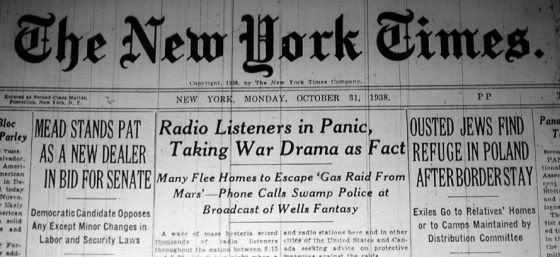
Radio Listeners in Panic,
Taking War Drama as Fact
http://www.war-of-the-worlds.org/Radio/Newspapers/Oct31/NYT.html
Many Flee Homes to Escape `Gas Raid From Mars'--Phone Calls Swamp Police at Broadcast of Wells Fantasy
A wave of mass hysteria seized thousands of radio listeners between 8:15 and 9:30 o'clock last night when a broadcast of a dramatization of H. G. Wells's fantasy, "The War of the Worlds," led thousands to believe that an interplanetary conflict had started with invading Martians spreading wide death and destruction in New Jersey and New York.
The broadcast, which disrupted households, interrupted religious services, created traffic jams and clogged communications systems, was made by Orson Welles, who as the radio character, "The Shadow," used to give "the creeps" to countless child listeners. This time at least a score of adults required medical treatment for shock and hysteria.
In Newark, in a single block at Heddon Terrace and Hawthorne Avenue, more than twenty families rushed out of their houses with wet handkerchiefs and towels over their faces to flee from what they believed was to be a gas raid. Some began moving household furniture.
Throughout New York families left their homes, some to flee to near-by parks. Thousands of persons called the police, newspapers and radio stations here and in other cities of the United States and Canada seeking advice on protective measures against the raids.
The program was produced by Mr. Welles and the Mercury Theatre on the Air over station WABC and the Columbia Broadcasting System's coast-to-coast network, from 8 to 9 o'clock.
The radio play, as presented, was to simulate a regular radio program with a "break-in" for the material of the play. The radio listeners, apparently, missed or did not listen to the introduction, which was: "The Columbia Broadcasting System and its affiliated stations present Orson Welles and the Mercury Theatre on the Air in `The War of the Worlds' by H. G. Wells."
They also failed to associate the program with the newspaper listening of the program, announced as "Today: 8:00-9:00--Play: H. G. Wells's `War of the Worlds'--WABC." They ignored three additional announcements made during the broadcast emphasizing its fictional nature.
Mr. Welles opened the program with a description of the series of which it is a part. The simulated program began. A weather report was given, prosaically. an announcer remoarked that the program would be continued from a hotel, with dance music. for a few moments a dance program was given in the usual manner. Then there was a "break-in" with a "flash" about a professor at an observatory noting a series of gas explosions on the planet Mars.
News bulletins and scene broadcasts followed, reporting, with the technique in which the radio had reported actual events, the landing of a "meteor" near Princeton N. J., "killing" 1,500 persons, the discovery that the "meteor" was a "metal cylinder" containing strange creatures from Mars armed with "death rays" to open hostilities against the inhabitants of the earth.
Despite the fantastic nature of the reported "occurrences," the program, coming after the recent war scare in Europe and a period in which the radio frequently had interrupted regularly scheduled programs to report developments in the Czechosolvak situation, caused fright and panic throughout the area of the broadcast.
Telephone lines were tied up with calls from listeners or persons who had heard of the broadcasts. Many sought first to verify the reports. But large numbers, obviously in a state of terror, asked how they could follow the broadcast's advice and flee from the city, whether they would be safer in the "gas raid" in the cellar or on the roof, how they could safeguard their children, and many of the questions which had been worrying residents of London and Paris during the tense days before the Munich agreement.
So many calls came to newspapers and so many newspapers found it advisable to check on the reports despite their fantastic content that The Associated Press sent out the following at 8:48 P. M.:
"Note to Editors: Queries to newspapers from radio listeners throughout the United States tonight, regarding a reported meteor fall which killed a number of New Jerseyites, are the result of a studio dramatization. The A. P."
Similarly police teletype systems carried notices to all stationhouses, and police short-wave radio stations notified police radio cars that the event was imaginary.
Message From the Police
The New York police sent out the following:
"To all receivers: Station WABC informs us that the broadcast just concluded over that station was a dramatization of a play. No cause for alarm."
The New Jersey State Police teletyped the following:
"Note to all receivers--WABC broadcast as drama re this section being attacked by residents of Mars. Imaginary affair."
From one New York theatre a manager reported that a throng of playgoers had rushed from his theatre as a result of the broadcast. He said that the wives of two men in the audience, having heard the broadcast, called the theatre and insisted that their husbands be paged. This spread the "news" to others in the audience.
The switchboard of The New York Times was overwhelmed by the calls. A total of 875 were received. One man who called from Dayton, Ohio, asked, "What time will it be the end of the world?" A caller from the suburbs said he had had a houseful of guests and all had rushed out to the yard for safety.
Warren Dean, a member of the American Legion living in Manhattan, who telephoned to verify the "reports," expressed indignation which was typical of that of many callers.
"I've heard a lot of radio programs, but I've never heard anything as rotten as that," Mr. Dean said. "It was too realistic for comfort. They broke into a dance program with a news flash. Everybody in my house was agitated by the news. It went on just like press radio news."
At 9 o'clock a woman walked into the West Forty-seventh Street police station dragging two children, all carrying extra clothing. She said she was ready to leave the city. Police persuaded her to stay.
A garbled version of the reports reached the Dixie Bus terminal, causing officials there to prepare to change their schedule on confirmation of "news" of an accident at Princeton on their New Jersey route. Miss Dorothy Brown at the terminal sought verification, however, when the caller refused to talk with the dispatcher, explaining to here that "the world is coming to an end and I have a lot to do."
Harlem Shaken By the "News"
Harlem was shaken by the "news." Thirty men and women rushed into the West 123d Street police station and twelve into the West 135th Street station saying they had their household goods packed and were all ready to leave Harlem if the police would tell them where to go to be "evacuated." One man insisted he had heard "the President's voice" over the radio advising all citizens to leave the cities.
The parlor churches in the Negro district, congregations of the smaller sects meeting on the ground floors of brownstone houses, took the "news" in stride as less faithful parishioners rushed in with it, seeking spiritual consolation. Evening services became "end of the world" prayer meetings in some.
One man ran into the Wadsworth Avenue Police Station in Washington Heights, white with terror, crossing the Hudson River and asking what he should do. A man came in to the West 152d Street Station, seeking traffic directions. The broadcast became a rumor that spread through the district and many persons stood on street corners hoping for a sight of the "battle" in the skies.
In Queens the principal question asked of the switchboard operators at Police Headquarters was whether "the wave of poison gas will reach as far as Queens." Many said they were all packed up and ready to leave Queens when told to do so.
Samuel Tishman of 100 Riverside Drive was one of the multitude that fled into the street after hearing part of the program. He declared that hundreds of persons evacuated their homes fearing that the "city was being bombed."
"I came home at 9:15 P.M. just in time to receive a telephone call from my nephew who was frantic with fear. He told me the city was about to be bombed from the air and advised me to get out of the building at once. I turned on the radio and heard the bradcast which coroborated what my nephew had said, grabbed my hat and coat and a few personal belongings and ran to the elevator. When I got to the street there were hundreds of people milling around in panic. Most of us ran toward Broadway and it was not until we stopped taxi drivers who had heard the entire broadcast on their radios that we knew what it was all about. It was the most asinine stunt I ever heard of."
"I heard that broadcast and almost had a heart attack," said Louis Winkler of 1,322 Clay Avenue, the Bronx. "I didn't tune it in until the program was half over, but when I heard the names and titles of Federal, State and municipal officials and when the `Secretary of the Interior' was introduced, I was convinced it was the McCoy. I ran out into the street with scores of others, and found people running in all directions. The whole thing came over as a news broadcast and in my mind it was a pretty crummy thing to do."
The Telegraph Bureau switchboard at police headquarters in Manhattan, operated by thirteen men, was so swamped with calls from apprehensive citizens inquiring about the broadcast that police business was seriously interfered with.
Headquarters, unable to reach the radio station by telephone, sent a radio patrol car there to ascertain the reason for the reaction to the program. When the explanation was given, a police message was sent to all precincts in the five boroughs advising the commands of the cause.
"They're Bombing New Jersey!"
Patrolman John Morrison was on duty at the switchboard in the Bronx Police Headquarters when, as he afterward expressed it, all the lines became busy at once. Among the first who answered was a man who informed him:
"They're bombing New Jersey!"
"How do you know?" Patrolman Morrison inquired.
"I heard it on the radio," the voice at the other end of the wire replied. "Then I went to the roof and I could see the smoke from the bombs, drifting over toward New York. What shall I do?"
The patrolman calmed the caller as well as he could, then asnwered other inquiries from persons who wanted to know whether the reports of a bombardment were true, and if so where they should take refuge.
At Brooklyn police headquarters, eight men assigned to the monitor switchboard estimated that they had answered more than 800 inquiries from persons who had been alarmed by the broadcast. A number of these, the police said, came from motorists who had heard the program over their car radios and were alarmed both for themselves and for persons at their homes. Also, the Brooklyn police reported, a preponderance of the calls seemed to come from women.
The National Broadcasting Company reported that men stationed at the WJZ transmitting station at Bound Brook, N. J., had received dozens of calls from residents of that area. The transmitting station communicated with New York an passed the information that there was no cuase for alarm to the persons who inquired later.
Meanwhile the New York telephone operators of the company found their switchboards swamped with incoming demands for information, although the NBC system had no part in the program.
Record Westchester Calls
The State, county, parkway and local police in Westchester Counter were swamped also with calls from terrified residents. Of the local police departments, Mount Vernon, White Plains, Mount Kisco, Yonkers and Tarrytown received most of the inquiries. At first the authorities thought they were being made the victims of a practical joke, but hwen the calls persisted an dincreased in volume they began to make inquiries. The New York Telephone Company reported that it had never handled so many calls in one hour in years in Westchester.
One man called the Mount Vernon Police Headquarters to find out "where the forty policement were killed"; another said he brother was ill in bed listening to the broadcast and when he heard the reports he got into an automobile and "disappeared." "I'm nearly crazy!" the caller exclaimed.
Because some of the inmates took the catastrophic reports seriously as they came over the radio, some of the hospitals and the county penitentiary ordered that the radios be turned off.
Thousands of calls came in to Newark Police Headquarters. These were not only from the terrorstricken. Hundreds of physicians and nurses, believing the reports to be true, called to volunteer their services to aid the "injured." City ofifcials also claled in to make "emergency" arrangements for the population. Radio cars were stopped by the panicky throughout that city.
Jersey City police headquarters received similiar clals. One woman asked detective Timothy Grooty, on duty there, "Shall I close my windows?" A man asked, "Have the police any extra gas masks?" Many of the callers, on being assured the reports were fiction, queried again and again, uncertain in whom to believe.
Scores of persons in lower Newark Avenue, Jersey City, left their homes and stood fearfully in the street, looking with apprehension toward the sky. A radio car was dispatched there to reassure them.
The incident at Hedden Terrace and Hawthorne Avenue, in Newark, one of the most dramatic in the area, caused a tie-up in traffic for blocks around. the more than twenty families there apparently believed the "gas attack" had started, and so reported to the police. An ambulance, three radio cars and a police emergency squad of eight men were sent to the scene with full inhalator apparatus.
They found the families with wet cloths on faces contorted with hysteria. The police calmed them, halted the those who were attempting to move thier furniture on their cars and after a time were able to clear the traffic snarl.
At St. Michael's Hospital, High Street and Central Avenue, in the heart of the Newark industrial district, fifteen men and women were treated for shock and hysteria. In some cases it was necessary to give sedatives, and nurses and physicians sat down and talked with the more seriously affected.
While this was going on, three persons with children under treatment in the institution telephoned that they were taking them out and leaving the city, but their fears were calmed when hospital authorities explained what had happened.
A flickering of electric lights in Bergen County from about 6:15 to 6:30 last evening provided a build-up for the terror that was to ensue when the radio broadcast started.
Without going out entirely, the lights dimmed and brightened alternately and radio reception was also affected. The Public Service Gas and Electric Company was mystified by the behavior of the lights, declaring there was nothing wrong at their power plants or in their distributing system. A spokesman for the service department said a call was made to Newark and the same situation was reported. He believed, he said, that the condition was general throughout the State.
The New Jersey Bell Telephone Company reported that every central office in the State was flooded with calls for more than an hour and the company did not have time to summon emergency operators to relieve the congestion. Hardest hit was the Trenton toll office, which handled calls from all over the East.
One of the radio reports, the statement about the mobilization of 7,000 national guardsmen in New Jersey, caused the armories of the Sussex and Essex troops to be swamped with calls from officers and men seeking information about the mobilization place.
Prayers for Deliverance
In Caldwell, N. J., an excited parishoner ran into the First Baptist Church during evening services and shouted that a meteor had fallen, showering death and destruction, and that North Jersey was threatened. The Rev. Thomas Thomas, the pastor quieted the congregation and all prayed for deliverance from the "catastrophe."
East Orange police headquarters received more than 200 calls from persons who wanted to know what to do to escape the "gas." Unaware of the broadcast, the switchboard operator tried to telephone Newark, but was unable to get the call through because the switchboard at Newark headquarters was tied up. The mystery was not cleared up until a teletype explanation had been received from Trenton.
More than 100 calls were received at Maplewood police headquarters and during the excitement two families of motorists, residents of New York City, arrived at the station to inquire how they were to get back to their homes now that the Pulaski Skyway had been blown up.
The women and children were crying and it took some time for the police to convince them that the catastrophe was fictitious. Many persons who called Maplewood said their neighbors were packing their possessions and preparing to leave for the country.
In Orange, N. J., an unidentified man rushed into the lobby of the Lido Theatre, a neighborhood motion picture house, with the intention of "warning" the audience that a meteor had fallen on Raymond Boulevard, Newark, and was spreading poisonous gases. Skeptical, Al Hochberg, manager of the theatre, prevented the man from entering the auditorium of the theatre and then called the police. He was informed that the radio broadcast was responsible for the man's alarm.
Emanuel Priola, bartender of a tavern at 442 Valley Road, West Orange, closed the place, sending away six customers, in the middle of the broadcast to "rescue" his wife and two children.
"At first I thought it was a lot of Buck Rogers stuff, but when a friend telephoned me that general orders had been issued to evacuate every one from the metropolitan area I put the customers out, closed the place and started to drive home," he said.
William H. Decker of 20 Aubrey Road, Montclair, N. J., denounced the broadcast as "a disgrance" and "an outrage," which he said had frightened hundreds of residents in his community, including children. He said he knew of one woman who ran into the street with her two children and asked for the help of neighbors in saving them.
"We were sitting in the living room casually listening to the radio," he said, "when we heard reports of a meteor falling near New Brunswick and reports that gas was spreading. Then there was an announcement of the Secretary of Interior from Washington who spoke of the happening as a major disaster. It was the worst thing I ever heard over the air."
Columbia Explains Broadcast
The Columbia Broadcasting System issued a statement saying that the adaption of Mr. Wells's novel which was broadcast "followed the original closely, but ot make the imaginary details more interesting to American listeners the adapter, Orson Welles, substituted an American locale for the English scenes of the story."
Pointing out that the fictional character of the broadcast had been announced four times and had been previously publicized, it continued:
"Nevertheless, the program apparently was produced with such vividness that some listeners who may have heard only fragments thought the broadcast was fact, not fiction. Hundreds of telephone calls reaching CBS stations, city authorities, newspaper offices and police headquarters in various cities testified to the mistaken belief.
"Naturally, it was neither Columbia's nor the Mercury Theatre's intention to mislead any one, and when it became evident that a part of the audience had been disturbed by th performance five announcements were read over the network later in the evening to reassure those listeners."
Expressing profound regret that his dramatic efforts should cause such consternation, Mr. Welles said: "I don't think we will choose anything like this again." He hesitated about presenting it, he disclosed, because "it was our thought that perhaps people might be bored or annoyed at hearing a tale so improbable."
--------------------------------------------------------------------------------
SCARE IS NATIONWIDE
Broadcast Spreads Fear In New England, the South and West
--------------------------------------------------------------------------------
Last night's radio "war scare" shocked thousands of men, women and children in the big cities throughout the country. Newspaper offices, police stations and radio stations were besieged with calls from anxious relatives of New Jersey residents, and in some places anxious groups discussed the impending menace of a disastrous war.
Most of the listeners who sought more information were widely confused over the reports they had heard, and many were indignant when they learned that fiction was the cause of their alarm.
In San Francisco the general impression of listeners seemed to be that an overwhelming force had invaded the United States from the air, was in the process of destroying New York and threatening to move westward. "My God," roared one inquirer into a telephone, "where can I volunteer my services? We've got to stop this awful thing."
Newspaper offices and radio stations in Chicago were swamped with telephone calls about the "meteor" that had fallen in New Jersey. Some said they had relatives in the "stricken area" and asked if the casualty list was available.
In parts of St. Louis men and women clustered in the streets in residential areas to discuss what they should do in the face of the sudden war. One suburban resident drove fifteen miles to a newspaper office to verify the radio "report."
In New Orleans a general impression prevailed that New Jersey had been devastated by the "invaders," but fewer inquiries were received than in other cities.
In Baltimore a woman engaged passage on an airliner for New York, where her daughter is in school.
The Associated Press gathered the following reports of reaction to the broadcast:
At Fayetteville, N. C., people with relatives in the section of New Jersey where the mythical visitation had its locale went to a newspaper office in tears, seeking information.
A message from Providence, R. I., said: "Weeping and hysterical women swamped the switchboard of The Providence Journal for details of the massacre and destruction at New York, and officials of the electric company received scores of calls urging them to turn off all lights so that the city would be safe from the enemy."
Mass hysteria mounted so high in some cases that people told the police and newspapers they "saw" the invasion.
The Boston Globe told of one woman who claimed she could "see the fire," and said she and many others in her neighborhood were "getting out of here."
Minneapolis and St. Paul police switchboards were deluged with calls from frightened people.
The Times-Dispatch in Richmond, Va., reported some of their telephone calls from people people who said they were "praying."
The Kansas City bureau of The Associated Press received inquiries on the "meteors" from Los Angeles, Salt Lake City, Beaumont, Texas, and St. Joseph, Mo., in addition to having its local switchboards flooded with calls. One telephone informant said he had loaded all his children into his car, had filled it with gasoline, and was going somewhere. "Where is it safe?" he wanted to know.
Atlanta reported that listeners throughout the Southeast "had it that a planet struck in New Jersey, with monsters and almost everything and anywhere from 40 to 7,000 people reported killed." Editors said responsible persons, known to them, were among the anxious information seekers.
In Birmingham, Ala., people gathered in groups and prayed, and Memphis had its full quota of weeping women calling in to learn the facts.
In Indianapolis a woman ran into a church screaming: "New York destroyed; it's the end of the world. You might as well go home to die. I just heard it on the radio." Services were dismissed immediately.
Five students at Brevard College, N. C., fainted and panic gripped the campus for a half hour with many students fighting for telephones to ask their parents to come and get them.
A man in Pittsburgh said he returned home in the midst of the broadcast and found his wife in the bathroom, a bottle of poison in her hand, and screaming: "I'd rather die this way than like that."
He calmed her, listened to the broadcast and then rushed to a telephone to get an explanation.
Officials of station CFRB, Toronto, said they never had had so many inquiries regarding a single broadcast, the Canadian Press reported.
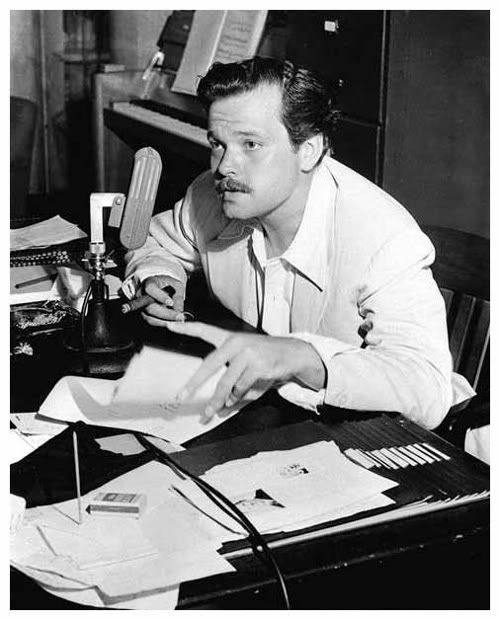
War of the Worlds, Orson Welles,
And The Invasion from Mars
http://www.transparencynow.com/welles.htm
The ability to confuse audiences en masse may have first become obvious as a result of one of the most infamous mistakes in history. It happened the day before Halloween, on Oct. 30, 1938, when millions of Americans tuned in to a popular radio program that featured plays directed by, and often starring, Orson Welles. The performance that evening was an adaptation of the science fiction novel The War of the Worlds, about a Martian invasion of the earth. But in adapting the book for a radio play, Welles made an important change: under his direction the play was written and performed so it would sound like a news broadcast about an invasion from Mars, a technique that, presumably, was intended to heighten the dramatic effect.
As the play unfolded, dance music was interrupted a number of times by fake news bulletins reporting that a "huge flaming object" had dropped on a farm near Grovers Mill, New Jersey. As members of the audience sat on the edge of their collective seat, actors playing news announcers, officials and other roles one would expect to hear in a news report, described the landing of an invasion force from Mars and the destruction of the United States. The broadcast also contained a number of explanations that it was all a radio play, but if members of the audience missed a brief explanation at the beginning, the next one didn't arrive until 40 minutes into the program.
At one point in the broadcast, an actor in a studio, playing a newscaster in the field, described the emergence of one of the aliens from its spacecraft. "Good heavens, something's wriggling out of the shadow like a gray snake," he said, in an appropriately dramatic tone of voice. "Now it's another one, and another. They look like tentacles to me. There, I can see the thing's body. It's large as a bear and it glistens like wet leather. But that face. It...it's indescribable. I can hardly force myself to keep looking at it. The eyes are black and gleam like a serpent. The mouth is V-shaped with saliva dripping from its rimless lips that seem to quiver and pulsate....The thing is raising up. The crowd falls back. They've seen enough. This is the most extraordinary experience. I can't find words. I'm pulling this microphone with me as I talk. I'll have to stop the description until I've taken a new position. Hold on, will you please, I'll be back in a minute."
As it listened to this simulation of a news broadcast, created with voice acting and sound effects, a portion of the audience concluded that it was hearing an actual news account of an invasion from Mars. People packed the roads, hid in cellars, loaded guns, even wrapped their heads in wet towels as protection from Martian poison gas, in an attempt to defend themselves against aliens, oblivious to the fact that they were acting out the role of the panic-stricken public that actually belonged in a radio play. Not unlike Stanislaw Lem's deluded populace, people were stuck in a kind of virtual world in which fiction was confused for fact.
News of the panic (which was conveyed via genuine news reports) quickly generated a national scandal. There were calls, which never went anywhere, for government regulations of broadcasting to ensure that a similar incident wouldn't happen again. The victims were also subjected to ridicule, a reaction that can commonly be found, today, when people are taken in by simulations. A cartoon in the New York World-Telegram, for example, portrayed a character who confuses the simulations of the entertainment industry with reality. In one box, the character is shown trying to stick his hand into the radio to shake hands with Amos n' Andy. In another, he reports to a police officer that there is "Black magic!!! There's a little wooden man -- Charlie McCarthy -- and he's actually talking!"
In a prescient column, in the New York Tribune, Dorothy Thompson foresaw that the broadcast revealed the way politicians could use the power of mass communications to create theatrical illusions, to manipulate the public.
"All unwittingly, Mr. Orson Welles and the Mercury Theater of the Air have made one of the most fascinating and important demonstrations of all time," she wrote. "They have proved that a few effective voices, accompanied by sound effects, can convince masses of people of a totally unreasonable, completely fantastic proposition as to create a nation-wide panic.
"They have demonstrated more potently than any argument, demonstrated beyond a question of a doubt, the appalling dangers and enormous effectiveness of popular and theatrical demagoguery....
"Hitler managed to scare all of Europe to its knees a month ago, but he at least had an army and an air force to back up his shrieking words.
"But Mr. Welles scared thousands into demoralization with nothing at all."
In the 1950s, America had another taste of the power that simulations have, to draw people into a world of delusional fantasy, when paired with mass communications. This time it was revealed that a number of television game shows were simulations, in which contestants who knew the answers ahead of time were pretending to guess at their responses. But unlike the invasion from Mars, here the fakery was unambiguously intentional; it was the work of producers who had concluded they could create fictional game shows that would be more exciting than the real thing.
Once again, there was a shocked reaction from the public. Once again, those involved became objects of public anger. And, as happened with the Orson Welles broadcast, an effort was made to ensure that such manipulations wouldn't recur.
But in 1990, it happened again. Audiences around the world discovered that they were taken in by the ultimate Hollywood illusion in which two performers faked their own talent, lip-syncing, to create the impression they were singing. What millions of fans had believed were two talented singers was actually a composite, another seamless interweaving of sensory simulations in which two people provided the visuals, while vocalists provided the audio.
As in the previous two instances, there was a stunned response. But unlike the experience of 1938 or even the 1950s, the social context was different because simulations had become commonplace, and attempts to use them to trick the public were the rule rather than the exception. Also by this time, a global culture had developed, which meant that tens of millions of people around the world were drawn into the same illusion.
One might say that War of the Worlds and the game show scandal foreshadowed the age of simulation that was still to come. Allowing for a little poetic overstatement, the Milli Vanilli scandal served as a rite of passage or symbolic marker, making clear that we now live in an age of simulation confusion in which our tendency to mistake fakes for what they imitate has become one of the characteristic problems of the age.
More to the point, we live in a time in which the ability to create deceptive simulations, especially for television, has become essential to the exercise of power. And the inability to see through these deceptions has become a form of powerlessness. Those who let themselves be taken in by the multiple deceptions of politics, news, advertising and public relations, are doomed, like the more gullible members of the radio audience in 1938, to play a role in other people's dramas, while mistakenly believing that they are reacting to something genuine.
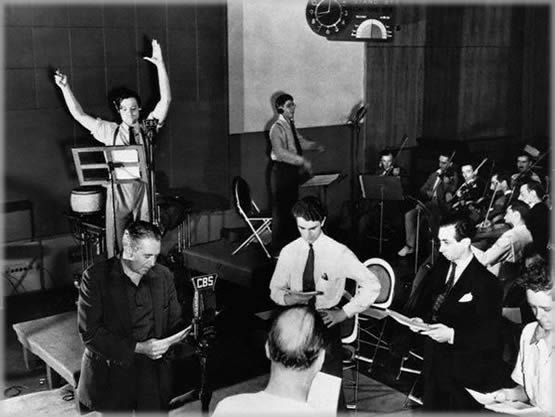
War of the Worlds Radio Documentary
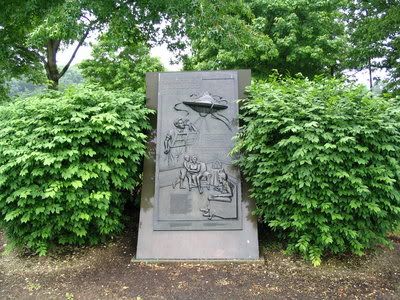
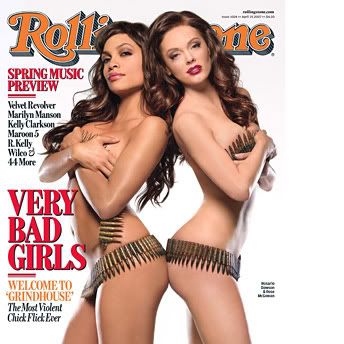











![Brotherhood" (2006) [TV-Series]](http://photos1.blogger.com/x/blogger2/1421/379621144723082/211/z/425926/gse_multipart33129.jpg)







No comments:
Post a Comment